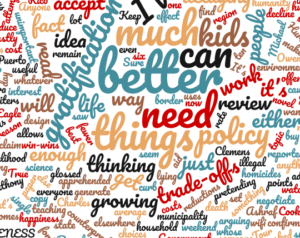Hi all,
So I was all set to write an upbeat intro with a little gif of me doing a dance of happiness at how sunny it is (and the fact that my wifi works in the garden), and then I saw the news about Anthony Bourdain. Bah. I remember buying my copy of A Cook’s Tour in 2001 in Oxford and reading about half of it in a single sitting – I enjoyed it much more than the bombast of Kitchen Confidential. Even better was his essay in Medium Raw, My Aim is True. It celebrated the work of one of the many invisible people involved in restaurant cookery, a Dominican prep cook, whose job was just to bone fish. It managed to get across the thrill of just watching someone brilliant at their work, and the focus on simple things that allowed him to achieve that state, while being an advert for Bourdain’s instinctive support for underdogs. Gah. Depression sucks.
- Have you seen those incredibly cute videos of kids doing the ‘marshmallow test’? The idea is that kids who are better at delaying gratification go on to have much better life outcomes when they get older. Well, IGNORE THE CUTENESS. THEY ARE LYING TO YOU. It turns out that rich kids, who probably bathe in marshmallows anyway, are way better at delaying gratification (not a surprise to anyone who’s read Scarcity, for all its overclaiming) – and it’s that socio-economic advantage, not the ability to delay gratification that explains most of their better life performance. The Atlantic reports.
- A few people have asked me what I think about Kate Raeworth’s idea of ‘doughnut economics’. I’ve not read the book, so I’ve been cautious in assessing it, but fortunately Branko Milanovic has, and his review confirms my fears. Branko’s review is really about trade-offs – at root, the fundamental subject of economics. Most things can be achieved, if we exert enough effort and spend enough resources on them. What’s interesting, and important for public policy, is the fact that doing these things require sacrifice. So, stop growing? Fine, but either you need coercion (to redistribute as much as we’ll need to) or you need to accept that much of humanity will remain in misery. Keep growing? Sure, but then you need to accept environmental degradation – at whatever rate technology allows for. Anyone on either side pretending that these trade-offs are unimportant or can be glossed over is lying to you.
- On this very topic, Owen Barder offers some structure for thinking about development-national interest ‘win-wins’. It’s a useful way of thinking about things, and makes clear that there are costs to a lot of this.
- “I find that a decline of ten homicides in an average municipality of this region caused six fewer children from there to be apprehended at the US border…” Michael Clemens uses a novel dataset and design to generate causal estimates on the effect of reductions in violence on illegal migration, and dings the US Government for wanting to reduce aid in an attempt to curb immigration, arguing that it would be counterproductive. He points out that migration is shaped by policy more than anything else, and those policy choices can make a huge difference.
- David Evans summarises a paper by Nava Ashraf and co-authors which suggests that teaching girls how to negotiate can have a causal impact on the likelihood that they will attend secondary school, a very cool intervention. They claim that it doesn’t seem to have a cost elsewhere in household spending, but I don’t buy that – it comes from something, even if it’s worth it.
- 538 on the death toll from the Puerto Rico Hurricane, and how the estimates are constructed and reported. They have some of the best science writers out there right now.
- Lastly, and for no other reason than I’ve been listening to it all day – The Screaming Eagle of Soul, Charles Bradley being awesome.
Have a great weekend, everyone!
R

